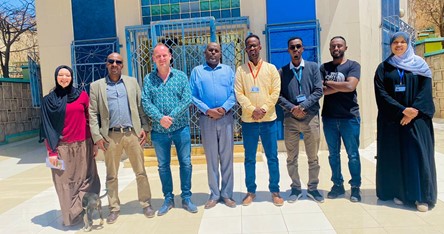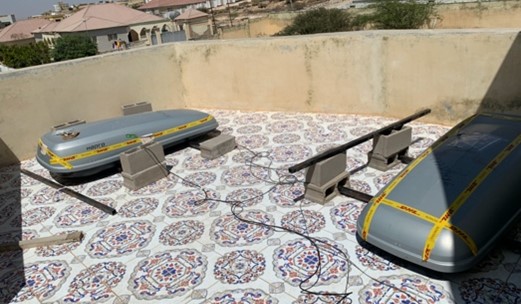Jaap Velthuis writes…
Somaliland is self-declared independent from Somalia: it has been autonomous since 1991 but is internationally unrecognised. It is democratic and has among the highest levels of poverty in the world. Somaliland’s government and industry have recognised that ICT is a great opportunity for sustainable economic development.
Somaliland has all key attributes to develop in this sector bar one:
- it is stable,
- there is a new high-speed internet link;
- there is a harbour in Berbera which enables importing equipment;
- there is space to locate large facilities;
- there is enormous potential to make exclusive use of green energy, like solar and wind power;
- and the 4G coverage is excellent.
The key ingredient that is missing is local, skilled workers. This is a key issue identified by the local government and business community.

The Transparency Solutions team with Dr De Sio and Dr Velthuis
A lot of data analysis techniques are developed within particle and astrophysics. These science areas are ideal to develop in Somaliland as the key science is done by analysing (publicly) available data, and as such requires scientific knowledge, a decent computer and an internet connection but no expensive laboratory equipment.
Dr Velthuis and Dr De Sio from the University of Bristol particle physics group travelled to Hargeisa to start a project with the University of Hargeisa, UoB’s strategic partner Transparency Solutions and local industry partners including Telesom and NGOs like Candlelight and ADAM Academy to boost capability in data analysis and data intensive research. This will not only help these organisations to become even more effective but also build capacity to boost industry potential. With ADAM, they will train pupils from minority backgrounds to empower disadvantaged groups.

The HiSPARC detectors are housed in two ski boxes placed on the roof of Transparency Solutions’ headquarters
Dr De Sio and Dr Velthuis installed a cosmic ray detector at Transparency Solutions’ headquarters and are now starting to teach data science techniques to students from the university but also to local industry partners. The cosmic ray detector used is developed by colleagues from the National Institute for Nuclear and High Energy Physics in the Netherlands. They have set up a large international network of such detectors called HiSPARC, which allows to start teaching advanced data analysis techniques including machine learning techniques.
“Cosmic ray physics is a great place to start learning about data intensive science, and we see the University of Hargeisa as a future partner for our research.
Green computing
With its new high-speed internet link and enormous potential for solar and wind power, Somaliland has great potential to host data centres powered by renewable energy. Telesom, the foremost telecom company in Somaliland, has recently made a pledge that they want to move to full solar power by 2030.
Our research and that of many of our colleagues requires a lot of computing power. I strongly believe that as a university, we have a duty to the planet to explore the potential of Somaliland for truly green computing duty.
